Features
UNHRC’s brand of justice relating to external evidence gathering

by Neville Ladduwahetty
During the 57th Session of the UNHRC, Sri Lanka restated its opposition to HRC Resolution 51/1; a carryover of Resolution 46/1. These Resolutions were “consistently rejected” on grounds that the evidence gathering mechanism within the Office of the High Commissioner for Human Rights (OHCHR) “is an unprecedented and ad hoc expansion of the Council’s mandate and contradicts its founding principles of impartiality, objectivity and non-selectivity”.
The OHCHR’s mandate under Resolution HRC 46/1 states: “In March 2021, the United Nations Human Rights Council, through its resolution 46/1, recognized the importance of preserving and analyzing evidence relating violations and abuses of human rights and related crimes in Sri Lanka with a view to advancing accountability…” (OHCHR, Frequently Asked Questions). This document states that its scope addresses “four specific tasks”. The first task is to: “collect, consolidate, preserve and analyze information and evidence of violations and abuses of human rights and related crimes committed in Sri Lanka”.
FACTORS AFFECTING EVIDENCE ANALYSIS
Since the focus is only on the first specific task, the comments below are based on the following parameters: 1 Armed Conflict and 2 Declaration of Emergency
1 ARMED CONFLICT
During the period February 2002 to May 2009 the conflict in Sri Lanka was categorised as an Armed Conflict by none other than the OHCHR in their report of 2015. Thus, as an Armed Conflict, the report states that the applicable law is Common Article 3 to the four Geneva Conventions, which means that any violations or abuses committed during the armed conflict must be judged under provisions of International Humanitarian Law and to derogated Human Rights Law during an Emergency.
Consequently, evidence gathering and its analysis should take into account provisions of Humanitarian Law as provided in Additional Protocol II of June 1977 relating to Non-International Armed Conflict as part of Customary Law.
“Article 6 of Additional Protocol II of 1977 – Penal prosecutions”
1. “This Article applies to the prosecution and punishment of criminal offences related to the armed conflict”.
2. “No sentence shall be passed and no penalty shall be executed on a person found guilty of an offence except pursuant to a conviction pronounced by a court offering the essential guarantees of independence and impartiality. In particular:
(a) The procedure shall provide for an accused to be informed without delay of the particulars of the offence alleged against him and shall afford the accused before and during his trial all necessary rights and means of defence;
(b) No one shall be convicted of an offence except on the basis of individual penal responsibility;
(c) No one shall be held guilty of any criminal offence on account of any act or omission which did not constitute a criminal offence, under the law, at the time when it was committed; nor shall a heavier penalty be imposed than that which was applicable at the time when the criminal offence was committed; if, after the commission of the offence, provision is made by law for the imposition of a lighter penalty, the offender shall benefit thereby;
(d) Anyone charged with an offence is presumed innocent until proved guilty according to law;
(e)Anyone charged with an offence shall have the right to be tried in his presence; (f) No one shall be compelled to testify against himself or to confess guilt”.
3. “A convicted person shall be advised on conviction of his judicial and other remedies and of the time-limits within which they may be exercised”.
4. “The death penalty shall not be pronounced on persons who were under the age of eighteen years at the time of the offence and shall not be carried out on pregnant women or mothers of young children”.
5. At the end of hostilities, the authorities in power shall endeavour to grant the broadest possible amnesty to persons who have participated in the armed conflict, or those deprived of their liberty for reasons related to the armed conflict, whether they are interned or detained”.
2 DECLARATION of an EMERGENCY
Since an emergency operated from May 2000 to June 2010 throughout Sri Lanka, Human Rights are derogated during this period as declared by Article 4 of ICCPR.
Article 4 of ICCPR states: “In times of public emergency which threatens the life of the nation and the existence of which is officially proclaimed, the State Parties to the present Covenant to the extent strictly required by the exigencies of the situation, provided that such measures are not inconsistent with their other obligations under international law…”.
Derogated Human Rights under emergency rules as permitted by ICCPR provisions stated in OISL Report are:
Articles 9 (2); 9 (3); 12 (1); 12 (2); 14 (3); 17 (1); 19 (2); 21 and 22 of the ICCPR.
Article 9 (2): “Anyone who is arrested shall be informed, at the time of arrest the reason for the arrest…”.
Article 9 (3): “Anyone arrested or detained on a criminal charge shall be brought before a judge….”.
Article 12 (1): “Everyone lawfully within the territory of State shall have the right to liberty of movement…”.
Article 12 (2): “Everyone shall be free to leave any country, including his own”.
14 (3): “In the determination of any charge, everyone shall be entitled to the following guarantees: to be informed promptly; time to prepare defence; tried without delay; tried in his presence; to examine witnesses against him; access to an interpreter; not to testify against him”.
Article 17 (1): “No one shall be subjected to arbitrary or unlawful interference with his privacy, family, home or correspondence nor to unlawfully attack his honour…”.
Article 19 (2): “Right to freedom of expression …”.
Article 21: “…right to peaceful assembly…”.
Article 22: “…right to freedom of association…”.
The OISL report concludes the list of derogated human rights during the period of the Armed Conflict by stating: “Measures taken pursuant to derogation are lawful to the extent they comply with the conditions set out in international human rights law as provided in Article 4 of ICCPR. In keeping with this provision, successive Sri Lankan Governments have derogated over a period of 10 years, 9 Articles out of a total of 19 Articles in Part II of the ICCPR that the OISL has declared as being lawful.
CONSOLIDATE, PRESERVE AND ANALYSE INFORMATION AND EVIDENCE
“The OHCHR Sri Lanka accountability project will collect information and evidence from all sources willing to provide it, including Government authorities, other Member States, victims, witnesses, civil society stakeholders and any other sources. Various UN bodies have already gathered extensive documentation of serious violations and abuses of human rights and violations of humanitarian law committed in Sri Lanka, particularly during and after the conflict, which ended in 2009. Information and evidence collected will be reviewed and analyzed by OHCHR Sri Lanka accountability project…” (Frequently Asked Questions from OHCHR).
Therefore, by OHCHR’s own admission, the sources that gave information and evidence will fade into oblivion and the information and evidence that would be left would only be the “reviewed and analyzed version formulated by OHCHR”.
This in essence amounts to a tampered version of what the witnesses and other source furnished; a procedure that not only trivialises the sanctity of evidence but also denies access to witnesses; a fundamental right called for by Article 14 (3) of the ICCPR. Furthermore, the witnesses and sources that furnished information and evidence are NOT in a position to verify whether the evidence furnished by them accurately reflects the “analyzed” version of the evidence in the possession of the OHCHR. Thus the procedure adopted by the evidence gathering mechanism violates natural justice as understood by the community of nations.
Consequently, those responsible for alleged violations and abuses are denied the opportunity to challenge the authenticity of the evidence presented, because the procedure does not provide “for an accused before and during his trial all necessary rights and means of defence” as called for by 2 (a) of Part 6 of Additional Protocol II of 1977 that today is accepted as Customary Law. Furthermore, the procedure does not permit whether the evidence presented guarantees that alleged violations assure that no one is “convicted of an offence except on the basis of individual penal responsibility” as stated in 2 (b) of Part 6 of Protocol II. Under the circumstances, the fact that UNHRC Resolution 46/1 followed by Resolution 51/1 was endorsed by the HR Council and the Co-Chairs is not only beyond belief, but has also become jointly a party to what amounts to UNHRC’s Brand of warped justice because it violates International Law.
CONCLUSION
As stated by the OHCHR “the information and evidence collected will be reviewed and analyzed by OHCHR Sri Lanka accountability project ….” However, what is not disclosed is the extent and scope of the analysis undertaken by the OHCHR. For instance, what is not disclosed is whether the information and evidence under the evidence gathering mechanism takes into account the special circumstances associated with the Armed Conflict and the fact that certain Human Rights are derogated during the Emergency that operated from May 2000 to June 2010.
Consequently, the evidence analysed by the OHCHR would drastically differ from the evidence furnished by witnesses and other sources in the event the OHCHR took into account the special circumstances of the Armed Conflict and the imposed Emergency. On the other hand, if the evidence gathered is the raw evidence furnished by witnesses and other sources, the need for the OHCHR to “analyze” the evidence does NOT ARISE.
Therefore, the outcome of the analysis is to tamper with the raw evidence presented; a task that not only far exceeds the mandate under which the UNHRC is authorized to operate but also trivializes the sanctity of evidence on which Justice depends. This makes the evidence gathering mechanism initiated by the UNHRC justified grounds for rejection; a fact that Sri Lanka should bring to the attention of the Member State of the HR Council and take joint action for the benefit of all. Furthermore, co-sponsoring such an exercise casts a deep shadow on the brand of justice that is being attempted jointly by the UNHRC and its sponsors at a time when the credibility, competence and relevance of the UN and its Institutions are in serious question.
Features
Meet the women protecting India’s snow leopards
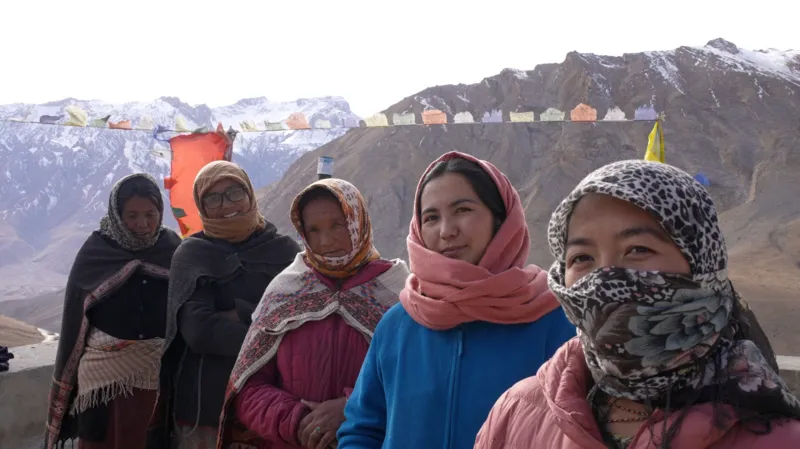
In one of India’s coldest and most remote regions, a group of women have taken on an unlikely role: protecting one of Asia’s most elusive predators, the snow leopard.
Snow leopards are found in just 12 countries across Central and South Asia. India is home to one of the world’s largest populations, with a nationwide survey in 2023 – the first comprehensive count ever carried out in the country – estimating more than 700 animals, .
One of the places they roam is around Kibber village in Himachal Pradesh state’s Spiti Valley, a stark, high-altitude cold desert along the Himalayan belt. Here, snow leopards are often called the “ghosts of the mountains”, slipping silently across rocky slopes and rarely revealing themselves.
For generations, the animals were seen largely as a threat, for attacking livestock. But attitudes in Kibber and neighbouring villages are beginning to shift, as people increasingly recognise the snow leopard’s role as a top predator in the food chain and its importance in maintaining the region’s fragile mountain ecosystem.
Nearly a dozen local women are now working alongside the Himachal Pradesh forest department and conservationists to track and protect the species, playing a growing role in conservation efforts.
Locally, the snow leopard is known as Shen and the women call their group “Shenmo”. Trained to install and monitor camera traps, they handle devices fitted with unique IDs and memory cards that automatically photograph snow leopards as they pass.
“Earlier, men used to go and install the cameras and we kept wondering why couldn’t we do it too,” says Lobzang Yangchen, a local coordinator working with a small group supported by the non-profit Nature Conservation Foundation (NCF) in collaboration with the forest department.
Yangchen was among the women who helped collect data for Himachal Pradesh’s snow leopard survey in 2024, which found that the state was home to 83 snow leopards – up from 51 in 2021.

The survey documented snow leopards and 43 other species using camera traps spread across an area of nearly 26,000sq km (10,000sq miles). Individual leopards were identified by the unique rosette patterns on their fur, a standard technique used for spotted big cats. The findings are now feeding into wider conservation and habitat-management plans.
“Their contribution was critical to identifying individual animals,” says Goldy Chhabra, deputy conservator of forests with the Spiti Wildlife Division.
Collecting the data is demanding work. Most of it takes place in winter, when heavy snowfall pushes snow leopards and their prey to lower altitudes, making their routes easier to track.
On survey days, the women wake up early, finish household chores and gather at a base camp before travelling by vehicle as far as the terrain allows. From there, they trek several kilometres to reach camera sites, often at altitudes above 14,000ft (4,300m), where the thin air makes even simple movement exhausting.
The BBC accompanied the group on one such trek in December. After hours of walking in biting cold, the women suddenly stopped on a narrow trail.
Yangchen points to pugmarks in the dust: “This shows the snow leopard has been here recently. These pugmarks are fresh.”
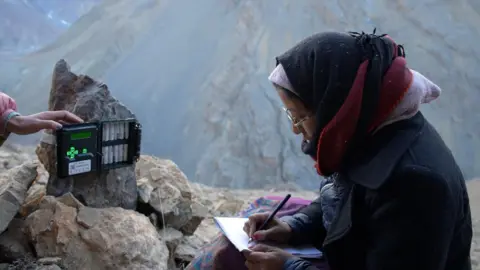
Along with pugmarks, the team looks for other signs, including scrapes and scent‑marking spots, before carefully fixing a camera to a rock along the trail.
One woman then carries out a “walk test”, crawling along the path to check whether the camera’s height and angle will capture a clear image.
The group then moves on to older sites, retrieving memory cards and replacing batteries installed weeks earlier.
By mid-afternoon, they return to camp to log and analyse the images using specialised software – tools many had never encountered before.
“I studied only until grade five,” says Chhering Lanzom. “At first, I was scared to use the computer. But slowly, we learned how to use the keyboard and mouse.”
The women joined the camera-trapping programme in 2023. Initially, conservation was not their motivation. But winters in the Spiti Valley are long and quiet, with little agricultural work to fall back on.
“At first, this work on snow leopards didn’t interest us,” Lobzang says. “We joined because we were curious and we could earn a small income.”
The women earn between 500 ($5.46; £4) and 700 rupees a day.
But beyond the money, the work has helped transform how the community views the animal.
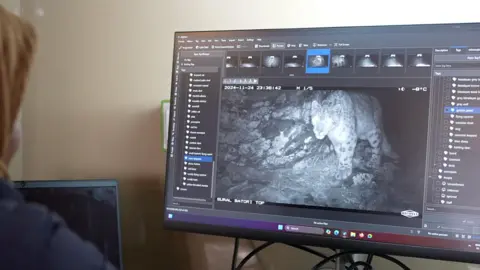
“Earlier, we thought the snow leopard was our enemy,” says Dolma Zangmo, a local resident. “Now we think their conservation is important.”
Alongside survey work, the women help villagers access government insurance schemes for their livestock and promote the use of predator‑proof corrals – stone or mesh enclosures that protect animals at night.
Their efforts come at a time of growing recognition for the region. Spiti Valley has recently been included in the Cold Desert Biosphere Reserve, a Unesco-recognised network aimed at conserving fragile ecosystems while supporting local livelihoods.
As climate change reshapes the fragile trans-Himalayan landscape, conservationists say such community participation will be crucial to safeguarding species like the snow leopard.
“Once communities are involved, conservation becomes more sustainable,” says Deepshikha Sharma, programme manager with NCF’s High Altitudes initiative.
“These women are not just assisting, they are becoming practitioners of wildlife conservation and monitoring,” she adds.
As for the women, their work makes them feel closer to their home, the village and the mountains that raised them, they say.
“We were born here, this is all we know,” Lobzang says. “Sometimes we feel afraid because these snow leopards are after all predatory animals, but this is where we belong.”
[BBC]
Features
Freedom for giants: What Udawalawe really tells about human–elephant conflict
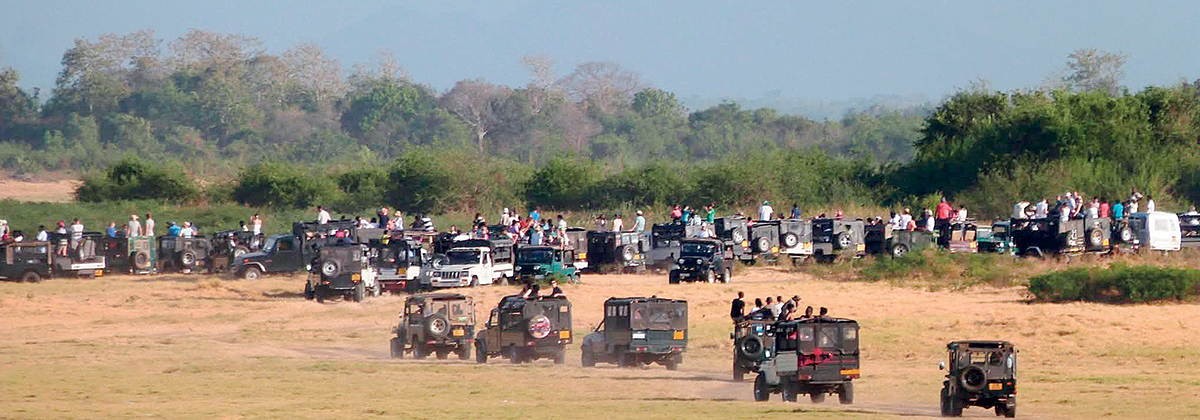
If elephants are truly to be given “freedom” in Udawalawe, the solution is not simply to open gates or redraw park boundaries. The map itself tells the real story — a story of shrinking habitats, broken corridors, and more than a decade of silent but relentless ecological destruction.
“Look at Udawalawe today and compare it with satellite maps from ten years ago,” says Sameera Weerathunga, one of Sri Lanka’s most consistent and vocal elephant conservation activists. “You don’t need complicated science. You can literally see what we have done to them.”
What we commonly describe as the human–elephant conflict (HEC) is, in reality, a land-use conflict driven by development policies that ignore ecological realities. Elephants are not invading villages; villages, farms, highways and megaprojects have steadily invaded elephant landscapes.
Udawalawe: From Landscape to Island
Udawalawe National Park was once part of a vast ecological network connecting the southern dry zone to the central highlands and eastern forests. Elephants moved freely between Udawalawe, Lunugamvehera, Bundala, Gal Oya and even parts of the Walawe river basin, following seasonal water and food availability.
Today, Udawalawe appears on the map as a shrinking green island surrounded by human settlements, monoculture plantations, reservoirs, electric fences and asphalt.
“For elephants, Udawalawe is like a prison surrounded by invisible walls,” Sameera explains. “We expect animals that evolved to roam hundreds of square nationakilometres to survive inside a box created by humans.”
Elephants are ecosystem engineers. They shape forests by dispersing seeds, opening pathways, and regulating vegetation. Their survival depends on movement — not containment. But in Udawalawa, movement is precisely what has been taken away.
Over the past decade, ancient elephant corridors have been blocked or erased by:
Irrigation and agricultural expansion
Tourism resorts and safari infrastructure
New roads, highways and power lines
Human settlements inside former forest reserves
“The destruction didn’t happen overnight,” Sameera says. “It happened project by project, fence by fence, without anyone looking at the cumulative impact.”
The Illusion of Protection
Sri Lanka prides itself on its protected area network. Yet most national parks function as ecological islands rather than connected systems.
“We think declaring land as a ‘national park’ is enough,” Sameera argues. “But protection without connectivity is just slow extinction.”
Udawalawe currently holds far more elephants than it can sustainably support. The result is habitat degradation inside the park, increased competition for resources, and escalating conflict along the boundaries.
“When elephants cannot move naturally, they turn to crops, tanks and villages,” Sameera says. “And then we blame the elephant for being a problem.”
The Other Side of the Map: Wanni and Hambantota
Sameera often points to the irony visible on the very same map. While elephants are squeezed into overcrowded parks in the south, large landscapes remain in the Wanni, parts of Hambantota and the eastern dry zone where elephant density is naturally lower and ecological space still exists.
“We keep talking about Udawalawe as if it’s the only place elephants exist,” he says. “But the real question is why we are not restoring and reconnecting landscapes elsewhere.”
The Hambantota MER (Managed Elephant Reserve), for instance, was originally designed as a landscape-level solution. The idea was not to trap elephants inside fences, but to manage land use so that people and elephants could coexist through zoning, seasonal access, and corridor protection.
“But what happened?” Sameera asks. “Instead of managing land, we managed elephants. We translocated them, fenced them, chased them, tranquilised them. And the conflict only got worse.”
The Failure of Translocation
For decades, Sri Lanka relied heavily on elephant translocation as a conflict management tool. Hundreds of elephants were captured from conflict zones and released into national parks like Udawalawa, Yala and Wilpattu.
The logic was simple: remove the elephant, remove the problem.
The reality was tragic.
“Most translocated elephants try to return home,” Sameera explains. “They walk hundreds of kilometres, crossing highways, railway lines and villages. Many die from exhaustion, accidents or gunshots. Others become even more aggressive.”
Scientific studies now confirm what conservationists warned from the beginning: translocation increases stress, mortality, and conflict. Displaced elephants often lose social structures, familiar landscapes, and access to traditional water sources.
“You cannot solve a spatial problem with a transport solution,” Sameera says bluntly.
In many cases, the same elephant is captured and moved multiple times — a process that only deepens trauma and behavioural change.
Freedom Is Not About Removing Fences
The popular slogan “give elephants freedom” has become emotionally powerful but scientifically misleading. Elephants do not need symbolic freedom; they need functional landscapes.
Real solutions lie in:
Restoring elephant corridors
Preventing development in key migratory routes
Creating buffer zones with elephant-friendly crops
Community-based land-use planning
Landscape-level conservation instead of park-based thinking
“We must stop treating national parks like wildlife prisons and villages like war zones,” Sameera insists. “The real battlefield is land policy.”
Electric fences, for instance, are often promoted as a solution. But fences merely shift conflict from one village to another.
“A fence does not create peace,” Sameera says. “It just moves the problem down the line.”
A Crisis Created by Humans
Sri Lanka loses more than 400 elephants and nearly 100 humans every year due to HEC — one of the highest rates globally.
Yet Sameera refuses to call it a wildlife problem.
“This is a human-created crisis,” he says. “Elephants are only responding to what we’ve done to their world.”
From expressways cutting through forests to solar farms replacing scrublands, development continues without ecological memory or long-term planning.
“We plan five-year political cycles,” Sameera notes. “Elephants plan in centuries.”
The tragedy is not just ecological. It is moral.
“We are destroying a species that is central to our culture, religion, tourism and identity,” Sameera says. “And then we act surprised when they fight back.”
The Question We Avoid Asking
If Udawalawe is overcrowded, if Yala is saturated, if Wilpattu is bursting — then the real question is not where to put elephants.
The real question is: Where have we left space for wildness in Sri Lanka?
Sameera believes the future lies not in more fences or more parks, but in reimagining land itself.
“Conservation cannot survive as an island inside a development ocean,” he says. “Either we redesign Sri Lanka to include elephants, or one day we’ll only see them in logos, statues and children’s books.”
And the map will show nothing but empty green patches — places where giants once walked, and humans chose. roads instead.
By Ifham Nizam
Features
Challenges faced by the media in South Asia in fostering regionalism
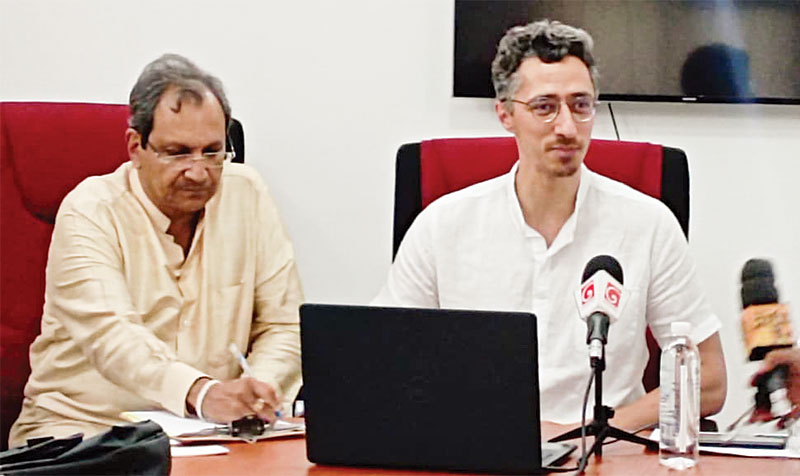
 SAARC or the South Asian Association for Regional Cooperation has been declared ‘dead’ by some sections in South Asia and the idea seems to be catching on. Over the years the evidence seems to have been building that this is so, but a matter that requires thorough probing is whether the media in South Asia, given the vital part it could play in fostering regional amity, has had a role too in bringing about SAARC’s apparent demise.
SAARC or the South Asian Association for Regional Cooperation has been declared ‘dead’ by some sections in South Asia and the idea seems to be catching on. Over the years the evidence seems to have been building that this is so, but a matter that requires thorough probing is whether the media in South Asia, given the vital part it could play in fostering regional amity, has had a role too in bringing about SAARC’s apparent demise.
That South Asian governments have had a hand in the ‘SAARC debacle’ is plain to see. For example, it is beyond doubt that the India-Pakistan rivalry has invariably got in the way, particularly over the past 15 years or thereabouts, of the Indian and Pakistani governments sitting at the negotiating table and in a spirit of reconciliation resolving the vexatious issues growing out of the SAARC exercise. The inaction had a paralyzing effect on the organization.
Unfortunately the rest of South Asian governments too have not seen it to be in the collective interest of the region to explore ways of jump-starting the SAARC process and sustaining it. That is, a lack of statesmanship on the part of the SAARC Eight is clearly in evidence. Narrow national interests have been allowed to hijack and derail the cooperative process that ought to be at the heart of the SAARC initiative.
However, a dimension that has hitherto gone comparatively unaddressed is the largely negative role sections of the media in the SAARC region could play in debilitating regional cooperation and amity. We had some thought-provoking ‘takes’ on this question recently from Roman Gautam, the editor of ‘Himal Southasian’.
Gautam was delivering the third of talks on February 2nd in the RCSS Strategic Dialogue Series under the aegis of the Regional Centre for Strategic Studies, Colombo, at the latter’s conference hall. The forum was ably presided over by RCSS Executive Director and Ambassador (Retd.) Ravinatha Aryasinha who, among other things, ensured lively participation on the part of the attendees at the Q&A which followed the main presentation. The talk was titled, ‘Where does the media stand in connecting (or dividing) Southasia?’.
Gautam singled out those sections of the Indian media that are tamely subservient to Indian governments, including those that are professedly independent, for the glaring lack of, among other things, regionalism or collective amity within South Asia. These sections of the media, it was pointed out, pander easily to the narratives framed by the Indian centre on developments in the region and fall easy prey, as it were, to the nationalist forces that are supportive of the latter. Consequently, divisive forces within the region receive a boost which is hugely detrimental to regional cooperation.
Two cases in point, Gautam pointed out, were the recent political upheavals in Nepal and Bangladesh. In each of these cases stray opinions favorable to India voiced by a few participants in the relevant protests were clung on to by sections of the Indian media covering these trouble spots. In the case of Nepal, to consider one example, a young protester’s single comment to the effect that Nepal too needed a firm leader like Indian Prime Minister Narendra Modi was seized upon by the Indian media and fed to audiences at home in a sensational, exaggerated fashion. No effort was made by the Indian media to canvass more opinions on this matter or to extensively research the issue.
In the case of Bangladesh, widely held rumours that the Hindus in the country were being hunted and killed, pogrom fashion, and that the crisis was all about this was propagated by the relevant sections of the Indian media. This was a clear pandering to religious extremist sentiment in India. Once again, essentially hearsay stories were given prominence with hardly any effort at understanding what the crisis was really all about. There is no doubt that anti-Muslim sentiment in India would have been further fueled.
Gautam was of the view that, in the main, it is fear of victimization of the relevant sections of the media by the Indian centre and anxiety over financial reprisals and like punitive measures by the latter that prompted the media to frame their narratives in these terms. It is important to keep in mind these ‘structures’ within which the Indian media works, we were told. The issue in other words, is a question of the media completely subjugating themselves to the ruling powers.
Basically, the need for financial survival on the part of the Indian media, it was pointed out, prompted it to subscribe to the prejudices and partialities of the Indian centre. A failure to abide by the official line could spell financial ruin for the media.
A principal question that occurred to this columnist was whether the ‘Indian media’ referred to by Gautam referred to the totality of the Indian media or whether he had in mind some divisive, chauvinistic and narrow-based elements within it. If the latter is the case it would not be fair to generalize one’s comments to cover the entirety of the Indian media. Nevertheless, it is a matter for further research.
However, an overall point made by the speaker that as a result of the above referred to negative media practices South Asian regionalism has suffered badly needs to be taken. Certainly, as matters stand currently, there is a very real information gap about South Asian realities among South Asian publics and harmful media practices account considerably for such ignorance which gets in the way of South Asian cooperation and amity.
Moreover, divisive, chauvinistic media are widespread and active in South Asia. Sri Lanka has a fair share of this species of media and the latter are not doing the country any good, leave alone the region. All in all, the democratic spirit has gone well into decline all over the region.
The above is a huge problem that needs to be managed reflectively by democratic rulers and their allied publics in South Asia and the region’s more enlightened media could play a constructive role in taking up this challenge. The latter need to take the initiative to come together and deliberate on the questions at hand. To succeed in such efforts they do not need the backing of governments. What is of paramount importance is the vision and grit to go the extra mile.
-

 Business7 days ago
Business7 days agoHayleys Mobility ushering in a new era of premium sustainable mobility
-

 Business4 days ago
Business4 days agoSLIM-Kantar People’s Awards 2026 to recognise Sri Lanka’s most trusted brands and personalities
-

 Business7 days ago
Business7 days agoAdvice Lab unveils new 13,000+ sqft office, marking major expansion in financial services BPO to Australia
-

 Business7 days ago
Business7 days agoArpico NextGen Mattress gains recognition for innovation
-

 Business6 days ago
Business6 days agoAltair issues over 100+ title deeds post ownership change
-

 Editorial7 days ago
Editorial7 days agoGovt. provoking TUs
-

 Business6 days ago
Business6 days agoSri Lanka opens first country pavilion at London exhibition
-

 Business5 days ago
Business5 days agoAll set for Global Synergy Awards 2026 at Waters Edge















